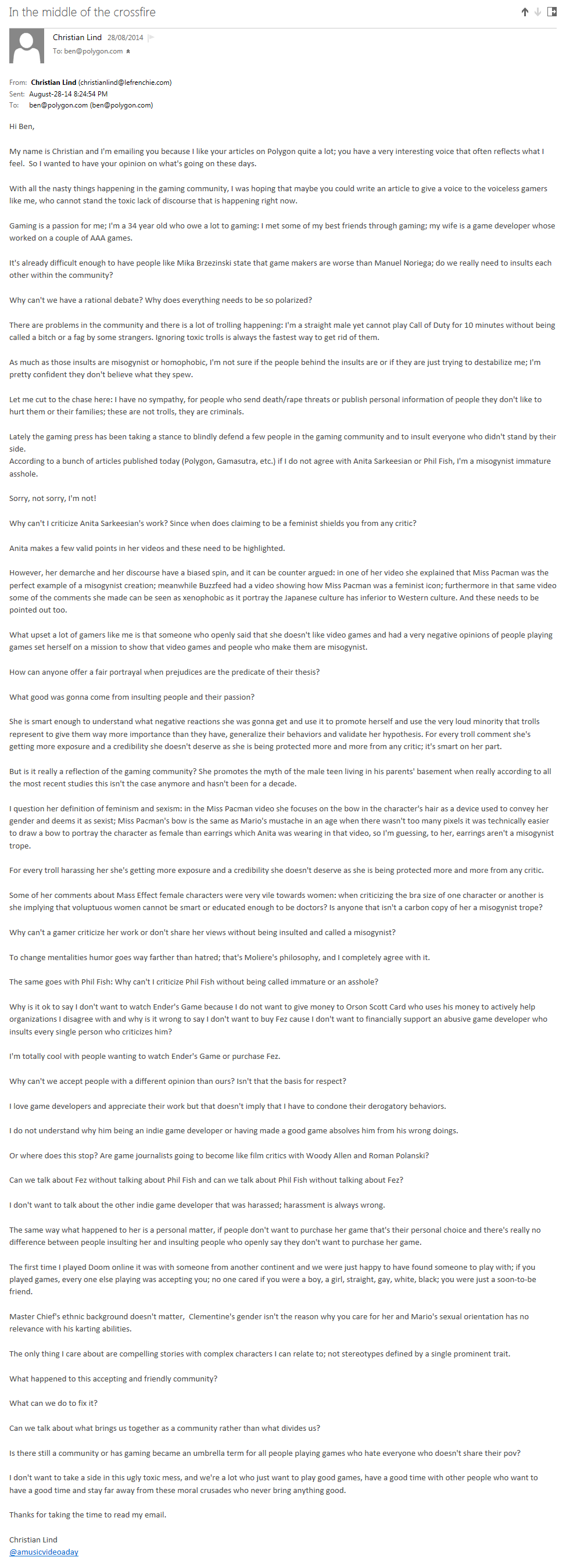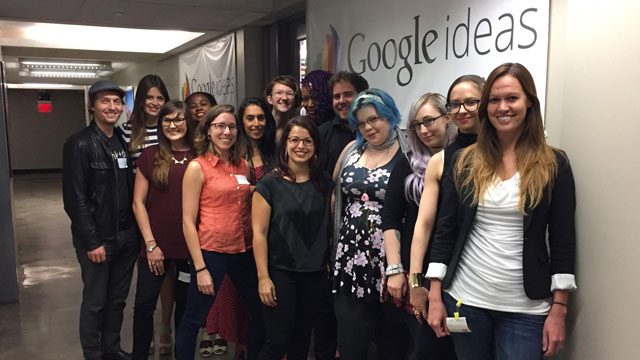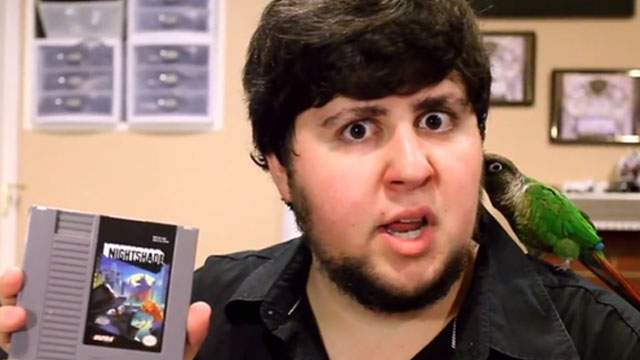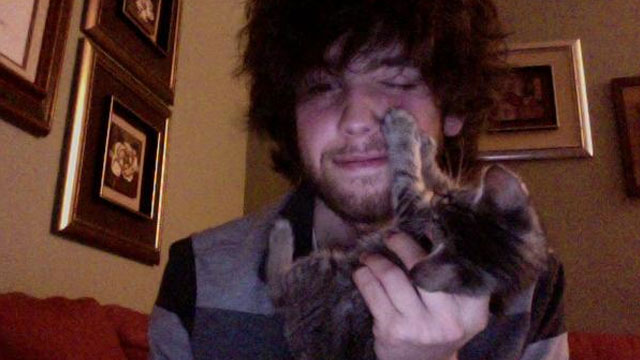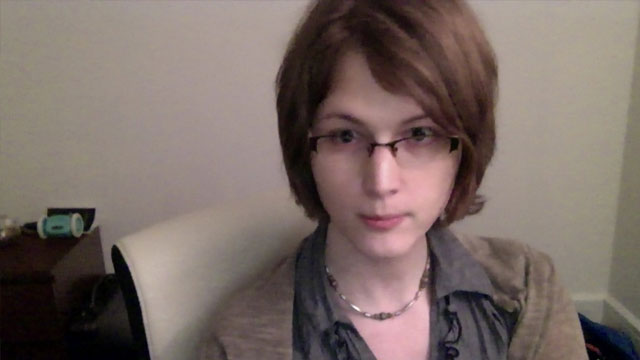I’ve never talked about it until now (almost a year later), but as I read through it with a different temporal outlook, it is striking to me that many questions raised in that email, heralded the stratospheric rise of #Gamergate (which had been coined the day before), hadn’t exploded yet. I’m going to use that brief conversation with one of the most despised game journalists, to share my thoughts about gaming and #Gamergate.
What Video Games Mean to Me
My gamertag is aMusicVideoaDay, the same as my twitter handle, and this is how video games have affected my life:
Once upon a time, I was a little kid in France who dreamt about living in the far-away city where MacGyver was filmed. My brother was 6 years older than I was, which made us hardly ever play sports or spend time together. The only times my brother and I would bond as siblings were when we were playing games together like Speedball 2 on my Atari ST and Budokan on his PC. All the happy memories I have about my brother involve playing video games together.
That was just one of the many things I owe to gaming.
One of my favorite games of all time, Monkey Island 2: LeChuck’s Revenge, is the reason why I started learning English—I never imagined how this would change my life.
 I still play Speedball 2 quite often, and always love when someone brings it up.
I still play Speedball 2 quite often, and always love when someone brings it up.
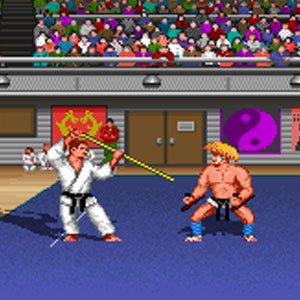 My brother always helped me pass that guy with the tonfas.
My brother always helped me pass that guy with the tonfas.
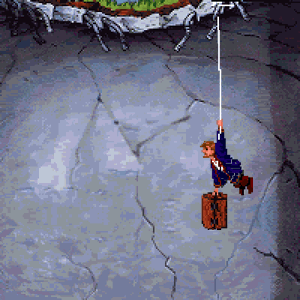 Oui, c’est grace a Guybrush que j’ai appris a parler Anglais.
Oui, c’est grace a Guybrush que j’ai appris a parler Anglais.
A few years later, on a different continent, I started college in Seattle. It’s hard for a kid to make friends in a new country, and even more difficult if you speak English with a funny accent, unless you start talking with your classmates and realize you both like the same games. The friends I made in college talking about and playing Halo with are still my friends today.
In the last decade, we’ve moved all around North America: my best friends live in San Diego, Chicago, Seattle, and I live in Vancouver (a few blocks from MacGyver’s houseboat), yet every Saturday we spend a few hours together, playing games; Halo still is a staple of our online hangouts.
If that wasn’t enough, I’ll never forget the day I was sent a friend’s request on PSN from an amazing girl I met a few days before. We talked for hours about our favorite RPGs: hers is Secret of Mana, mine is Fallout and, at the time, we were both playing Mass Effect 2 and talking about the different paths our Shepards were taking. I’m not sure when I realized I wanted to spend the rest of my life with her, I can’t remember where our first date was, but I do remember that the day I got her friend request, and I knew she was someone special.
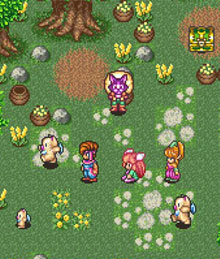 Secret of Mana is an amazing JRPG released on the Super Nintendo.
Secret of Mana is an amazing JRPG released on the Super Nintendo.
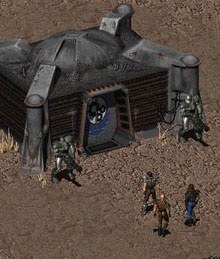 Fallout is the very first game where I experienced complete freedom.
Fallout is the very first game where I experienced complete freedom.
The Mass Effect trilogy has been as influential on my life as the original StarWars trilogy. The second Mass Effect is the pinnacle of the series.
Right now, as I’m writing about how games affected my life, all I can think about is how, without gaming, I wouldn’t have fallen in love with that amazing girl, wouldn’t have met some of my best friends, and my brother and I would probably be estranged by now.
So to answer the original question: all my life, video games have inspired me to pursue my dreams, not to be afraid of the unknown, and they taught me that no matter how challenging the journey is, in the end, the cake is very real.
The Context
Please bear in mind that this is a transcript of an email that was sent the day the “Gamers Are Dead” articles came out; I was morally exhausted, like many of us; English is my second language and I have dyslexia, so the email is full of typos. I’m not going to correct them here, just for authenticity’s sake (the original email is included at the end of this article).
Back in August, I didn’t know about Ben Kuchera’s friendship with some of the persons mentioned in this email, nor did I know about his shady reporting about Brad Wardell or the existence of the GameJournoPros list. I liked some of his articles, which were denuded of political ideology, like this article about The Elder Scrolls Online. I also liked Polygon for its offbeat features, like the one on Rob Weithoff, the voice of John Marston in Red Dead Redemption.
I naively emailed him to share my concerns about what was happening in the community, and how the press response to it was flabbergasting.
The Email I sent to Polygon’s Editor, Ben Kuchera, on August 28th 2014
Hi Ben,
My name is Christian and I’m emailing you because I like your articles on Polygon quite a lot; you have a very interesting voice that often reflects what I feel. So I wanted to have your opinion on what’s going on these days.
With all the nasty things happening in the gaming community, I was hoping that maybe you could write an article to give a voice to the voiceless gamers like me, who cannot stand the toxic lack of discourse that is happening right now.
Gaming is a passion for me; I’m a 34 year old who owe a lot to gaming: I met some of my best friends through gaming; my wife is a game developer whose worked on a couple of AAA games.
It’s already difficult enough to have people like Mika Brzezinski state that game makers are worse than Manuel Noriega; do we really need to insults each other within the community?
Why can’t we have a rational debate? Why does everything needs to be so polarized?
There are problems in the community and there is a lot of trolling happening: I’m a straight male yet cannot play Call of Duty for 10 minutes without being called a bitch or a fag by some strangers. Ignoring toxic trolls is always the fastest way to get rid of them.
As much as those insults are misogynist or homophobic, I’m not sure if the people behind the insults are or if they are just trying to destabilize me; I’m pretty confident they don’t believe what they spew.
Let me cut to the chase here: I have no sympathy, for people who send death/rape threats or publish personal information of people they don’t like to hurt them or their families; these are not trolls, they are criminals.
Lately the gaming press has been taking a stance to blindly defend a few people in the gaming community and to insult everyone who didn’t stand by their side.
According to a bunch of articles published today (Polygon, Gamasutra, etc.) if I do not agree with Anita Sarkeesian or Phil Fish, I’m a misogynist immature asshole.
Sorry, not sorry, I’m not!
Why can‘t I criticize Anita Sarkeesian’s work? Since when does claiming to be a feminist shields you from any critic?
Anita makes a few valid points in her videos and these need to be highlighted.
However, her demarche and her discourse have a biased spin, and it can be counter argued: in one of her video she explained that Miss Pacman was the perfect example of a misogynist creation; meanwhile Buzzfeed had a video showing how Miss Pacman was a feminist icon; furthermore in that same video some of the comments she made can be seen as xenophobic as it portray the Japanese culture has inferior to Western culture. And these needs to be pointed out too.
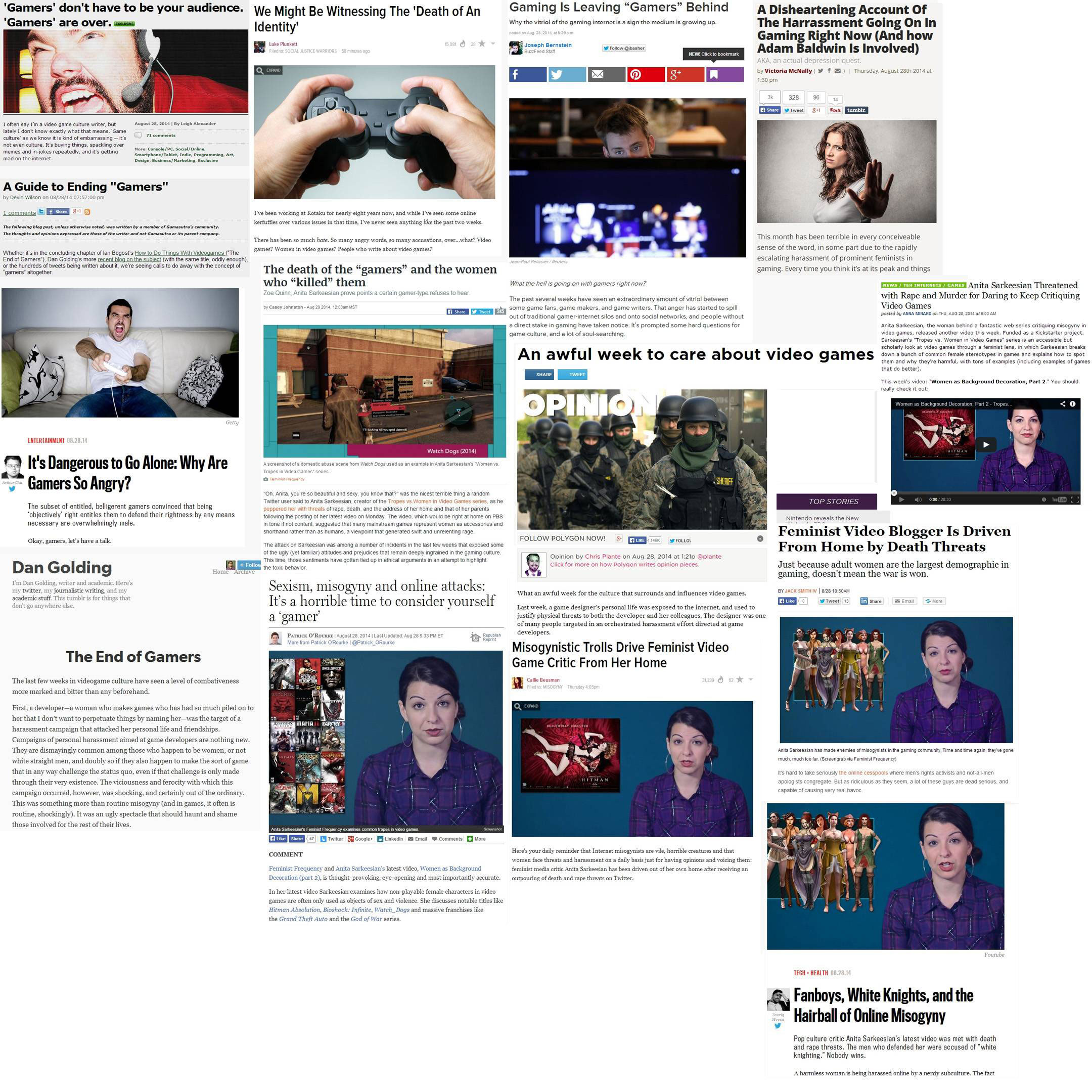
What upset a lot of gamers like me is that someone who openly said that she doesn’t like video games and had a very negative opinions of people playing games set herself on a mission to show that video games and people who make them are misogynist.
Anita says Miss Pacman is a mysoginist trope.
BuzzFeed says Miss Pacman is a feminist icon.
Anita says she doesn’t play games, doesn’t like them and doesn’t like gamers.
How can anyone offer a fair portrayal when prejudices are the predicate of their thesis?
What good was gonna come from insulting people and their passion?
She is smart enough to understand what negative reactions she was gonna get and use it to promote herself and use the very loud minority that trolls represent to give them way more importance than they have, generalize their behaviors and validate her hypothesis. For every troll comment she’s getting more exposure and a credibility she doesn’t deserve as she is being protected more and more from any critic; it’s smart on her part.
But is it really a reflection of the gaming community? She promotes the myth of the male teen living in his parents‘ basement when really according to all the most recent studies this isn’t the case anymore and hasn’t been for a decade.
I question her definition of feminism and sexism: in the Miss Pacman video she focuses on the bow in the character’s hair as a device used to convey her gender and deems it as sexist; Miss Pacman’s bow is the same as Mario’s mustache in an age when there wasn’t too many pixels it was technically easier to draw a bow to portray the character as female than earrings which Anita was wearing in that video, so I’m guessing, to her, earrings aren’t a misogynist trope.
 Misss Pacman has 2 gender identifiers: lipstick and a bow; only one of them is sexist according to Anita; guess which one?
Misss Pacman has 2 gender identifiers: lipstick and a bow; only one of them is sexist according to Anita; guess which one?
 A long time ago, character sprites used very few pixels, it was much easier to give Mario a moustache than a mouth.
A long time ago, character sprites used very few pixels, it was much easier to give Mario a moustache than a mouth.
 Anita wears lipstick and earrings so these are fine, but she doesn’t wear a bow so bows are sexist. Coincidence? I think not.
Anita wears lipstick and earrings so these are fine, but she doesn’t wear a bow so bows are sexist. Coincidence? I think not.
For every troll harassing her she’s getting more exposure and a credibility she doesn’t deserve as she is being protected more and more from any critic.
Some of her comments about Mass Effect female characters were very vile towards women: when criticizing the bra size of one character or another is she implying that voluptuous women cannot be smart or educated enough to be doctors? Is anyone that isn’t a carbon copy of her a misogynist trope?
 Dr. Liara T’Soni is an acclaimed Asari researcher who has spent the past 50 years of her life studying Prothean technology and culture, but according to Anita, Liara being busty makes her being a Doctor, unrealistic.
Dr. Liara T’Soni is an acclaimed Asari researcher who has spent the past 50 years of her life studying Prothean technology and culture, but according to Anita, Liara being busty makes her being a Doctor, unrealistic.
 Lara Croft is a scholar and archaeologist who ventures into ancient, hazardous tombs and ruins around the world; and who, according to Anita, is unrealistic because women who wear short shorts cannot be academics.
Lara Croft is a scholar and archaeologist who ventures into ancient, hazardous tombs and ruins around the world; and who, according to Anita, is unrealistic because women who wear short shorts cannot be academics.
 According to Anita, the Scythian is the pinnacle of feminist characters; I’m sure it has nothing to do with being androgynous, dressing modestly and having long dark hair, like Anita herself.
According to Anita, the Scythian is the pinnacle of feminist characters; I’m sure it has nothing to do with being androgynous, dressing modestly and having long dark hair, like Anita herself.
Why can‘t a gamer criticize her work or don’t share her views without being insulted and called a misogynist?
To change mentalities humor goes way farther than hatred; that’s Moliere’s philosophy, and I completely agree with it.
The same goes with Phil Fish: Why can’t I criticize Phil Fish without being called immature or an asshole?
Why is it ok to say I don’t want to watch Ender’s Game because I do not want to give money to Orson Scott Card who uses his money to actively help organizations I disagree with and why is it wrong to say I don’t want to buy Fez cause I don’t want to financially support an abusive game developer who insults every single person who criticizes him?
 Talented game designer who has for habit to insult anyone who dares to criticize his work.
Talented game designer who has for habit to insult anyone who dares to criticize his work.
 Gifted sci-fi writer who actively funds anti-LGBT organizations.
Gifted sci-fi writer who actively funds anti-LGBT organizations.
 Brilliant filmmaker who fled America after drugging and raping a teenage girl.
Brilliant filmmaker who fled America after drugging and raping a teenage girl.
I’m totally cool with people wanting to watch Ender’s Game or purchase Fez.
Why can‘t we accept people with a different opinion than ours? Isn’t that the basis for respect?
I love game developers and appreciate their work but that doesn’t imply that I have to condone their derogatory behaviors.
I do not understand why him being an indie game developer or having made a good game absolves him from his wrong doings.
Or where does this stop? Are game journalists going to become like film critics with Woody Allen and Roman Polanski?
Can we talk about Fez without talking about Phil Fish and can we talk about Phil Fish without talking about Fez?
I don’t want to talk about the other indie game developer that was harassed; harassment is always wrong.
The same way what happened to her is a personal matter, if people don’t want to purchase her game that’s their personal choice and there’s really no difference between people insulting her and insulting people who openly say they don’t want to purchase her game.
 The harassment Zoe Quinn was the victim of, was unfair; want to blame someone for her game coverage? Blame Nathan Grayson.
The harassment Zoe Quinn was the victim of, was unfair; want to blame someone for her game coverage? Blame Nathan Grayson.
However, the harassment she got, doesn’t absolve the fact that she, herself, is an abuser.
The first time I played Doom online it was with someone from another continent and we were just happy to have found someone to play with; if you played games, every one else playing was accepting you; no one cared if you were a boy, a girl, straight, gay, white, black; you were just a soon-to-be friend.
Master Chief’s ethnic background doesn’t matter, Clementine’s gender isn’t the reason why you care for her and Mario’s sexual orientation has no relevance with his karting abilities.
The only thing I care about are compelling stories with complex characters I can relate to; not stereotypes defined by a single prominent trait.
 The love gamers have for the master chief comes from his valor and courage; not the skin color hiding behind his helmet.
The love gamers have for the master chief comes from his valor and courage; not the skin color hiding behind his helmet.
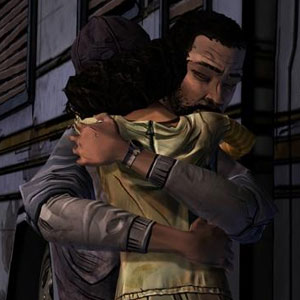 If you’re the kind of parent who thinks you would love your child more if she/he was of the opposite gender, you’re a bad parent.
If you’re the kind of parent who thinks you would love your child more if she/he was of the opposite gender, you’re a bad parent.
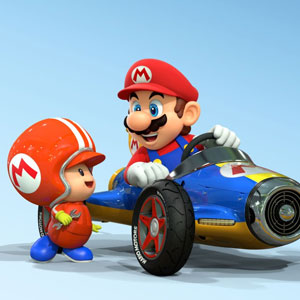 Wether Mario is straight or mushroomsexual, his sexual orientation has no agency when it comes to steering a kart.
Wether Mario is straight or mushroomsexual, his sexual orientation has no agency when it comes to steering a kart.
What happened to this accepting and friendly community?
What can we do to fix it?
Can we talk about what brings us together as a community rather than what divides us?
Is there still a community or has gaming became an umbrella term for all people playing games who hate everyone who doesn’t share their pov?
I don‘t want to take a side in this ugly toxic mess, and we’re a lot who just want to play good games, have a good time with other people who want to have a good time and stay far away from these moral crusades who never bring anything good.
Thanks for taking the time to read my email.
First Email from Ben
20 minutes after I sent my email, I received one back from Ben that stunned me; I wasn’t sure how to respond to it.
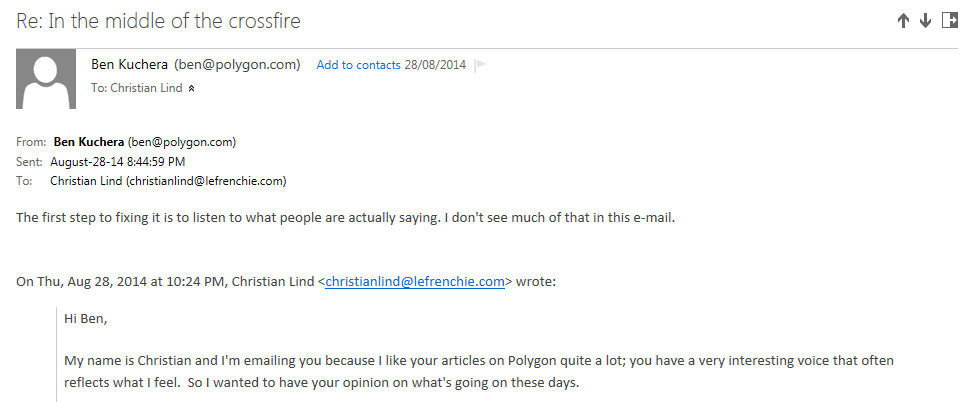
Second Email from Ben
I was still thinking about how I could respond, when I received a second email from Ben which was much more interesting; so I decided to gather my thoughts, sleep on it, and email him back in the morning.
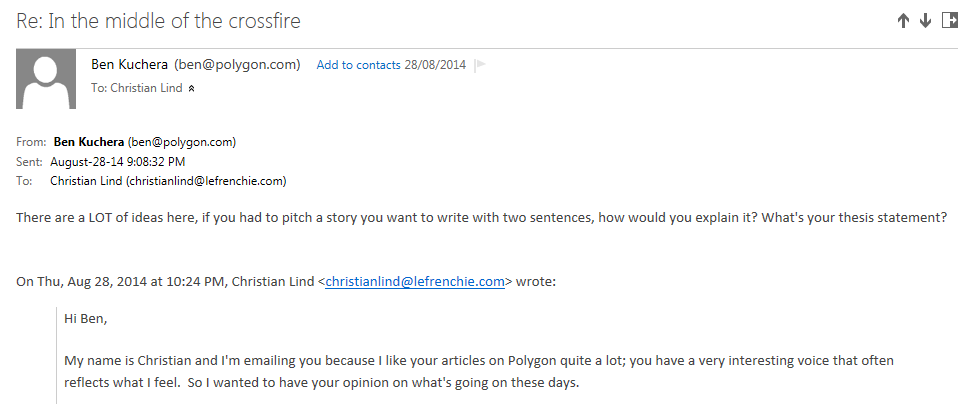
My Second Email
When I woke up at 5am, I decided to re-read my original email, try to see where my words might have gone further than I wished, and how I could engage a dialogue. I tried to synthetize what I felt in the best way I could, and what I heard from many other gamers. Unsurprisingly, Ben never emailed me back.

Almost a year later, a lot has changed, yet my feelings towards the gaming press, the disaspora, and the ideology they blindly serve, haven’t changed:
A lot of passionate gamers are sickened and feeling alienated by the screaming match between a loud fringe who displays the worst the gaming community has to offer and a moralist group who rejects anyone with a divergent opinion.
Understanding what #Gamergate is:
There are as many ways to define #Gamergate, as there are opinions about it. Some you might agree with and some you might find preposterous, so let me try to be as broad and complete as I can.
Let’s start the easy way: #Gamergate is a Twitter hashtag used by members of the gaming community to argue about the state and future of gaming as a medium and art form.
To me, #Gamergate is the gaming ideological battleground of a culture war between the authoritarian self-proclaimed progressist left, composed of people on the fringe of the gaming industry (indie developers and gaming press) and left-leaning libertarian gamers who just want to play good games without being subjected to political propaganda, whichever it may be.
The self-proclaimed progressists believe that the sole purpose of art should be to promote the ideology that they deem progressive; that pieces not serving this purpose should be censored or banned, and the creators not abiding by their ideology should be basically shamed, slandered and silenced.
The libertarians believe that creators should be free to make and sell any game they want; that, if a game is good, it will find its audience and that the press should judge games based on objective criteria, and not by the political alignment of their creators.
To most of the AAA developers and publishers, #Gamergate is a mess: it’s a clash between the people who buy their games and the very loud gaming press, who wish to dictate the creative content of games. Anyone who dares to utter a comment, one way or another, is attacked by people on both sides. The only safe and sane thing to do to not have your career livelihood threatened, is to remain silent and let all the parties involved argue in their corners, despite secretly being comforted that customers care about creative freedom and are not oblivious to the yellow journalism plaguing the industry.

According to the fauxgressists (term coined by David Auerbach), #Gamergate is an harassment campaign, started by Zoe Quinn’s ex-boyfriend, to spread false allegations and smear her character. It has evolved into a hate movement, the sole purpose of which, is to drive women out of the gaming industry. Anti-Gamergaters relentlessly talk about Zoe Quinn’s harassment, as well as developer Brianna Wu being driven out of her home after receiving death/rape threats, and media critic Anita Sarkeesian being forced to cancel a public appearance after a bomb threat. They will also claim that all the members of #Gamergate are paranoid, uneducated right wing teenage straight white male nut-jobs living in their parents’ basement, who wrongfully believe that someone wants to take away their games.
This presentation of #Gamergate is not only factually inaccurate, but also intellectually dishonest: everything posted on the ZoePost has been corroborated by Zoe Quinn herself. Furthermore, claiming she’s the victim of a jilted ex is referred to, in psychology, as DARVO (Deny, Attack, and Reverse Victim and Offender), a technique used by bullies and abusers when being caught.
Photographic evidence has proven that, while Brianna Wu was parading in interviews and claiming that she was hiding, fearing for her life, she was actually in the comfort of her own home office. If this wasn’t enough to debunk her claims, after a public spat on social media, her local law enforcement and prosecution claimed that she never filed any report of any incident.
When it comes to Anita Sarkeesian’s claim that a severe bomb threat forced her to cancel one of her appearances, the Utah law enforcement offices dismissed evidence of any credible threat, and the Utah State University has publicly stated that the cancellation was neither due to a bomb threat, nor due to them fearing any security issue—the cancellation was requested by Sarkeesian herself, after her demand for the USU Students Bill of Rights to be amended, was denied by the university.
This isn’t to say that these three women haven’t been harassed or haven’t received threats; it is highlighting that the gravity of these threats have been greatly exaggerated for the sole purpose of marketing their personal crowdfunding campaigns, which is an insult to all the victims of harassment, who don’t get any media coverage, and don’t turn their victimhood into lucrative careers.
Also, let’s not forget that a Twitter hashtag can be used by anyone, so claiming that these threats are coming exclusively from #Gamergate supporters, and not from third-party trolls, is a fallacy. Many #Gamergate supporters have also been victims of harassment. Pretending that the victims are only on one side is a disingenuous misrepresentation.
The biggest piece of factual evidence debunking the harassment campaign myth comes from a Newsweek article in which, despite a dishonest editorial, data proved that harassing or threatening tweets were not only marginal (less than 1.2%), but also not coming from accounts actively involved with #Gamergate.
Finally, despite being dismissed as a crazy conspiracy, Anita Sarkeesian and her cult following are the ones who started petitions to ban the sale of Grand Theft Auto V from Australian retail stores and the game Hatred to be pulled from the digital sales platform, Steam.
One Year Later Update: The Academic Fraud & The CON Artist
Equating Verbal Criticism To Physical Violence At The U.N.
Wannabe academic and media critic, Anita Sarkeesian who disable comments and like or dislike features on all the videos she posts on the Feminist Frequency YouTube account claimed to the United Nations that criticism of her work was akin to physical violence.
Here is the kind of video debunking Feminist Frequency poorly researched work that Sarkeesian claims to be harassment when it, at its core, is peer review.
Bonafide Google and Twitter’s Trust & Safety Council Partners
Feminist Frequency is financially backing the Crash Override Network founded by Zoe Quinn, and crybully Randi Harper. This ideological diaspora has succeeded to be recognized as a Twitter partner status and talking to other tech firms about internet safety.
LeoPirate has been banned from Twitter for relentlessly exposing Crash Override Network and its members’ clique for what they are: hypocrites and online abusers.
Jon Tron
When Polaris’ Game_Jam collapsed due to sexism allegations, the gaming community stood behind the alleged victim; gamers didn’t know the event had been kyboshed on purpose by Zoe Quinn. Jon Tron, the YouTuber paired with Quinn, witnessed firsthand the bullying techniques used to silence dissenters.
Eron Gjoni
Eron is the biggest victim of Chelsea Van Valkenburg aka Zoe Quinn; on top of emotionally abusing him for months, he was smeared by her friends in the press for the last couple of years and had to legally defend himself against her fraudulently manipulating the justice system to abuse him.
Justine Tunney
Justine is a software developer turned activist who founded OccupyWallSt.org; her unapologetic and vocal support for the #Gamergate movement has put her in the crosshair of the self-proclaimed internet abuse specialists of the Crash Override Network who tried to slander her name and get her fired.
On the opposite side, we find the ones who identify #Gamergate as a consumer revolt and grassroots movement, whose goals are to expose and fight biased and corrupt journalism in the gaming industry. This is indeed very vague, and the lack of clarity in messaging has always been one of the biggest flaws of the #Gamergate movement. Supporters have spent a tremendous amount of time clarifying the meaning of the statement and responding to harassment claims, rather than exposing and combating cronyism and yellow journalism.
Early on, #Gamergate supporters have claimed that a third party group of trolls were responsible for harassing #Gamergate detractors and supporters alike. One of the early pieces of content created by the movement stated that supporters were condemning personal threats and supporting women in gaming. To this day, the picture created is still the single most shared piece of content by supporters of the movement.
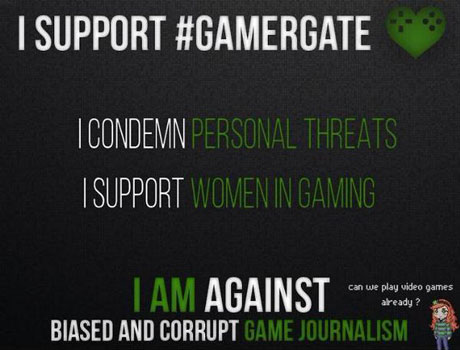
Unlike detractors of the movement, whose motto is “Listen and Believe,” #Gamergate supporters have offered several proofs of their goodwill when it comes to supporting women in gaming. They’ve crowdfunded The Fine Young Capitalists, a group set up to organize production initiatives for women in the media industry, as well as several other projects lead by women, including BasedGamer.com.
It is important to note that unlike gaming outlets, whose staff members are predominantly Caucasian males, #Gamergate supporters come from every walk of life: all genders with a wide variety of ethnic backgrounds and sexual orientations. Most minorities within the #Gamergate movement identify with the #NotYourShield hashtag, which denounces the political use of minorities in rhetorical arguments by the gaming press.
At its core, #Gamergate has always asked for three things:
1- Transparency/disclosure of conflict of interests and providing extended coverage to friends and acquaintances.
2- That journalists leave their personal political bias out of reviews, the goal of which is supposed to determine if a video game offers enough qualitative value to justify a purchase or not.
3- Ceasing to slander and infantilize gamers with opinions that differ from theirs.
 The gaming press didn’t hesitate to call out immature, gamers who criticized the LGBT friendly Gone Home for its poor storytelling.
The gaming press didn’t hesitate to call out immature, gamers who criticized the LGBT friendly Gone Home for its poor storytelling.
 The same indie developer who criticized female characters, for having unrealistic proportions is responsible for these.
The same indie developer who criticized female characters, for having unrealistic proportions is responsible for these.
 Sunset’s developers blamed gamers for their commercial failure, showing a complete lack of accountability in the process.
Sunset’s developers blamed gamers for their commercial failure, showing a complete lack of accountability in the process.
Despite what its detractors are claiming, the #Gamergate movement has accomplished tremendous achievements: the vast majority of the big gaming websites have either created or updated their “Code of Ethics” policies, and disclosure paragraphs are appearing on many articles. They’ve exposed the rampant corruption and McCarthyism-inspired practices of groups like IGF, IGDA and DIGRA.
The creation and promotion of alternative news outlets fostering diversity of opinions is also to its credit: DeepFreeze.it is an embodiement of the original #Gamergate ethos.
The most pronounced line at E3 2015: “We make the games we’d like to play, and we love the people who enjoy them” is a very politically correct sign of sympathy towards the movement.
But in almost a year, the movement itself has evolved and a few people who were sympathetic to the movement early on are slowly distancing themselves from it; not because they disagree with the initial goals, but because they see the movement being co-opted by newcomers and straying away.
Has #Gamergate become what it used to stand against?
Every time a prominent #Gamergate supporter has been interviewed, their demand for objective criteria when it comes to game reviews has been met with comments stating that reviews cannot be objective; that if film reviews are taken as an example, they are subjective. No one has ever addressed this comment in a skillful way. Unfortunately, most have stumbled on this issue, and this has come up so many times.
As inadequate as comparing film and game reviews is, film reviews do indeed have objective criteria: screenwriting, acting, cinematography, editing, sound design, and art direction are used to measure the quality of movies. These criteria can be applied to game reviews, but #Gamergate hasn’t been talking about game quality in a while.
 Are the characters compelling? Is the story following the Hero’s Journey? Any plot holes?
Are the characters compelling? Is the story following the Hero’s Journey? Any plot holes?
 How’s the art direction? Is the world building cohesive and believable?
How’s the art direction? Is the world building cohesive and believable?
 Are the gameplay mechanics proficient? Is the game difficulty balanced, or unfair?
Are the gameplay mechanics proficient? Is the game difficulty balanced, or unfair?
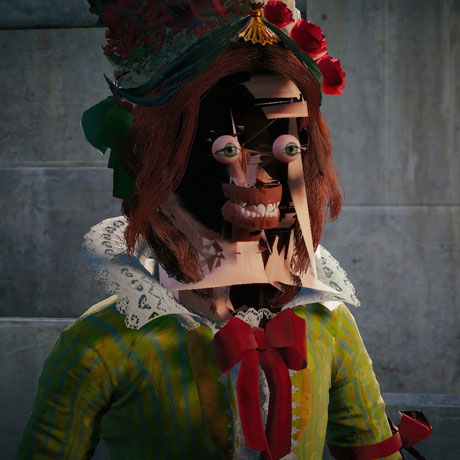 In what state is the game at launch? Is the game ridden with bugs?
In what state is the game at launch? Is the game ridden with bugs?
It seems that in the last few months, a lot of the chatter within #Gamergate has not been about ethics or good games in general: a lot of comments I’ve been reading are defenses and attacks of games solely based on what anti-GGs are saying about them.
In many ways, the promotion and purchase of Hatred by pro-GGs is indistinguishable from the purchase and promotion of Gone Home by anti-GGs: a mediocre/average game, bought for the sole reason to promote an ideology.
Even more troubling? During the year of the FIFA Women World Cup, EA decides to include the women national teams. Instead of being happy to have more football/soccer, a few very loud people on the #Gamergate side start complaining about it, and every argument or comment made is referencing anti-GGs.
Just because anti-GGs think one thing, does not mean we have to think the opposite! Can’t we have our own opinion that isn’t based on a blind antagonist reaction to the other side?
 Hatred is an average game which sales are a political statement; this has nothing to do with the game’s quality.
Hatred is an average game which sales are a political statement; this has nothing to do with the game’s quality.
 A number of pro-GGs are complaining about FIFA adding women teams because anti-GGs are pleased by this inclusion.
A number of pro-GGs are complaining about FIFA adding women teams because anti-GGs are pleased by this inclusion.
 Nothing constructive is ever going to come from politicizing a game based on the other side’s like or dislike of it.
Nothing constructive is ever going to come from politicizing a game based on the other side’s like or dislike of it.
There has also been a lot of talk about wearing #Gamergate clothing at conventions, and I understand that Vivian James is a very cute totem and that we’d love to wear a shirt with the movement mascot on it. But the main reason this is being advocated is to provoke the opposition by shoving politics down people’s throats in the form of a garment.
Drama for drama’s sake.
Liana Kerzner used the term second wave #Gamergaters in an interview she did, to refer to #Gamergate supporters who are just in the movement to oppose self-proclaimed social justice warriors. I find it very relevant: these are people just in the movement to foster drama, promote their own ideology, gain a certain clout, and attack anyone who dares to express a divergent opinion.
I’ve seen people, stating that they felt neutral, being told that being neutral implies that they are against ethics in journalism. This is the same fallacy used by radical third wave gender ideologues: if you’re not with us, you’re against us; if you’re not a feminist, then you are against gender equality.
Whenever questioned about the cognitive dissonance between their praxis and what they claim to stand for, both sides hide behind the original intent of their movement, despite taking actions completely conflicting with said intent.
What happened to diversity of opinion within #Gamergate?
#Gamergate has come a long way, and has broken the false narrative promoted by very powerful media organizations. The movement being hijacked by some who want to cultivate drama and hustle their ideology has been noticed by many people. Captain Kirk himself hinted about it!
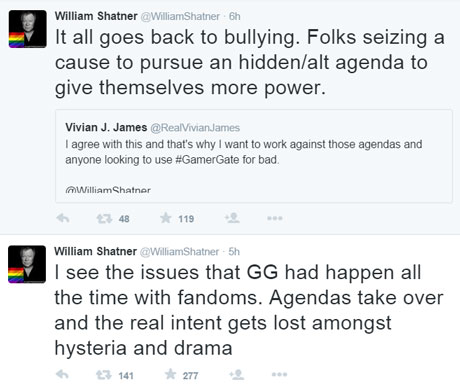
In a time when AAA devs are posting on #Gamegate’s own subreddit, KotakuInAction, and openly dismissing the asinine comments from the Sarkeesian clan and other censors, let’s not forget what #Gamergate is supposed to be about.
War. War never changes.
It’s a year later; a lot of things have changed, and a lot of the people who just wanted to play games and have a good time have been identifying or sympathizing with #Gamergate. They’ve found the much needed support they were looking for against the radical authoritarian ideologues and other trolls.
When #Gamegate acts as senselessly as what it sets itself to stand against, for these gamers, it’s back to square one: they are still asked to take sides in a culture war they don’t want any part of, and their simple wish is still ignored by all of the groups claiming to have their best interests at heart.
They are still in the middle of the crossfire.
For reference: my original email
